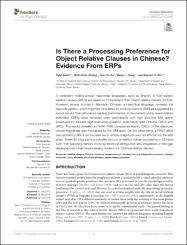| dc.contributor.author | Bulut, Talat | |
| dc.contributor.author | Cheng, Shih-Kuen | |
| dc.contributor.author | Xu, Kun-Yu | |
| dc.contributor.author | Hung, Daisy L. | |
| dc.contributor.author | Wu, Denise H. | |
| dc.date.accessioned | 10.07.201910:49:13 | |
| dc.date.accessioned | 2019-07-10T19:50:26Z | |
| dc.date.available | 10.07.201910:49:13 | |
| dc.date.available | 2019-07-10T19:50:26Z | |
| dc.date.issued | 2018 | en_US |
| dc.identifier.citation | Bulut, T., Cheng, S., Xu, K., Hung, D. ve Wu, D. (2018). Is there a processing preference for object relative clauses in chinese? Evidence from erps. Journal of Frontiers in Psycholog, 9. https://dx.doi.org/10.3389/fpsyg.2018.00995 | en_US |
| dc.identifier.issn | 1664-1078 | |
| dc.identifier.uri | https://dx.doi.org/10.3389/fpsyg.2018.00995 | |
| dc.identifier.uri | https://hdl.handle.net/20.500.12511/1981 | |
| dc.description | WOS: 000437898900001 | en_US |
| dc.description | PubMed ID: 30038589 | en_US |
| dc.description.abstract | A consistent finding across head-initial languages, such as English, is that subject relative clauses (SRCs) are easier to comprehend than object relative clauses (ORCs). However, several studies in Mandarin Chinese, a head-final language, revealed the opposite pattern, which might be modulated by working memory (WM) as suggested by recent results from self-paced reading performance. In the present study, event-related potentials (ERPs) were recorded when participants with high and low WM spans (measured by forward digit span and operation span tests) read Chinese ORCs and SRCs. The results revealed an N400-P600 complex elicited by ORCs on the relativizer, whose magnitude was modulated by the WM span. On the other hand, a P600 effect was elicited by SRCs on the head noun, whose magnitude was not affected by the WM span. These findings paint a complex picture of relative clause processing in Chinese such that opposing factors involving structural ambiguities and integration of filler-gap dependencies influence processing dynamics in Chinese relative clauses. | en_US |
| dc.description.sponsorship | National Science Council of Taiwan [NSC 102-2628-H-008-002-MY3] | en_US |
| dc.description.sponsorship | This work was supported by grants from National Science Council of Taiwan (NSC 102-2628-H-008-002-MY3). | en_US |
| dc.language.iso | eng | en_US |
| dc.publisher | Frontiers Media Sa | en_US |
| dc.rights | info:eu-repo/semantics/openAccess | en_US |
| dc.rights | Attribution 4.0 International | * |
| dc.rights.uri | https://creativecommons.org/licenses/by/4.0/ | * |
| dc.subject | Relative Clauses | en_US |
| dc.subject | Chinese Sentence Comprehension | en_US |
| dc.subject | Working Memory | en_US |
| dc.subject | Integration Resources | en_US |
| dc.subject | Storage Resources | en_US |
| dc.subject | Linear Distance | en_US |
| dc.subject | Structural Distance | en_US |
| dc.subject | Event-Related Potentials | en_US |
| dc.title | Is there a processing preference for object relative clauses in chinese? Evidence from erps | en_US |
| dc.type | article | en_US |
| dc.relation.ispartof | Frontiers in Psychology | en_US |
| dc.department | İstanbul Medipol Üniversitesi, Sağlık Bilimleri Fakültesi, Dil ve Konuşma Terapisi Bölümü | en_US |
| dc.identifier.volume | 9 | en_US |
| dc.relation.publicationcategory | Makale - Uluslararası Hakemli Dergi - Kurum Öğretim Elemanı | en_US |
| dc.identifier.doi | 10.3389/fpsyg.2018.00995 | en_US |
| dc.identifier.wosquality | Q2 | en_US |
| dc.identifier.scopusquality | Q1 | en_US |



















